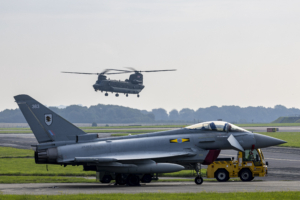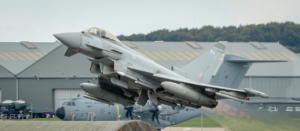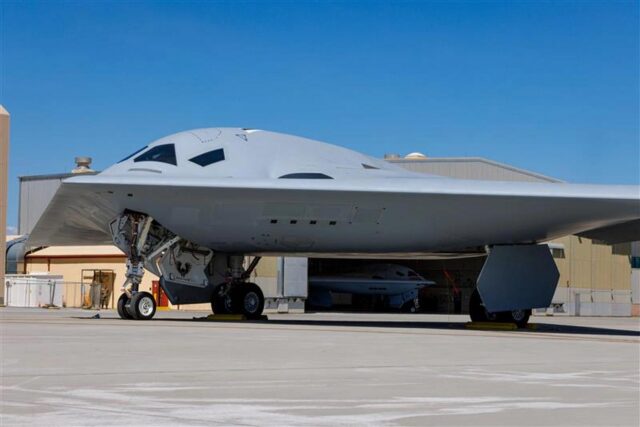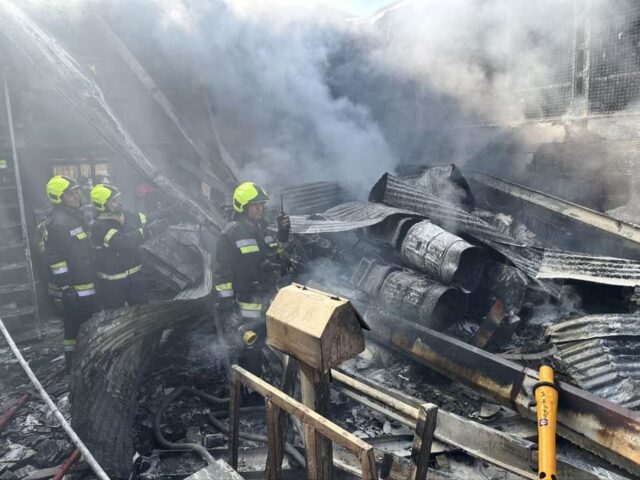British Trade Union Unite repeats its call for a new UK Typhoon buy
January 25, 2025

The Union said that it “understood” that a government decision was imminent concerning the purchase of new aircraft for the RAF, and said that the choice was between the British-made Eurofighter Typhoon and the American-made Lockheed Martin F-35A.
With a constrained defence budget many believe that there is no headroom for such a purchase, and that Combat Air spending will be focused on the Anglo-Italian-Japanese GCAP (Global Combat Aircraft Programme), also known as Tempest. There may also be funding for bringing F-35B numbers to 74 in order to sustain carrier strike capabilities through to the planned out of service date (OSD) of HMS Queen Elizabeth and HMS Prince of Wales.
The ongoing withdrawal of the oldest ‘Tranche 1’ Typhoons will reduce UK Combat Air mass, and if this is to be restored, Unite says, ‘Buying British’ through a Typhoon purchase is the best way forward.
Unite’s general secretary, Sharon Graham, said that: “We have been saying for some time that The MoD needs to place a further order for Typhoon aircraft, which will fulfil a military requirement, maintain industrial capacity, and preserve jobs and skills. Labour must now step up to the plate and make the clear unequivocal investment decisions that workers and their employers desperately need.”

Letter to the House of Commons Defence Committee (4 November)
Unite had previously written to the House of Commons Defence Committee (from Steve McGuinness, on behalf of the BAE Warton Unit AMMSS Joint Shop Stewards Committee amd BAE Warton Unit Professional Staff Negotiating Committee to the HCDC Chair, Mr Dhesi), on 4 November 2024.
McGuinness wrote that: “As it stands as I write this letter there are currently no Typhoons being final assembled at Warton site and no orders for any future aircraft, essentially production has stopped for British-built Typhoon aircraft. We are becoming increasingly concerned with reports that the Typhoons being retired from active RAF service are to be replaced with American built F-35A aircraft.
“It is important to note that the UK industrial workshare on the F-35 programme is not dependent on how many actual platforms the UK acquires. The UK industrial position on the programme is due to the sovereign Intellectual Property and direct investment that the UK brought as a Tier 1 partner so if the UK decides to acquire no more F-35s this will not impact the economic return to the UK from the wider programme.”
Buying F-35As would, McGuinness insisted, be: “a hammer blow to the British aircraft industry and potentially could end the design, manufacture and assembly of fast jets in this country, seriously damaging our sovereign capability.”
“The defence minister, John Healey, recently said “a nation is only as strong as its national industry”. This is asentiment we wholeheartedly agree with. Combat Air should sit at the heart of any new Government industrial strategy – it’s an international success story – generating high value skilled jobs, delivering huge economic benefit and creating world leading intellectual property for defence and other sectors.”
McGuinness urged the British Government to commit to ordering “a squadron of 24 Typhoon jets,”, noting that the UK was the only partner nation in the Eurofighter consortium that hasn’t committed to buying new aircraft.
McGuinness highlighted the economic benefits of a Typhoon order: “A domestic order will not only fulfil a military requirement for the RAF in these unstable times but will also ensure that vital skills required to build the next generation aircraft, GCAP, are retained at Warton Unit; we have serious concerns that without a domestic order for Typhoon there will be no GCAP due to the loss of the skills necessary to build and fly aircraft. Furthermore we feel a domestic order will give other nations considering buying Typhoon off the UK (Qatar, Saudi Arabia, Turkey, Egypt and Poland amongst others) the confidence to invest in the platform, providing export revenue to the country and ensuring the longevity of our sites. The Eurofighter Typhoon programme delivers in the region of £2bn per annum to the UK economy, directly employs 6500 people with an additional 14,000 in the supply chain and delivers around £1.6bn – £2bn per annum of export revenue. The original UK Government investment in the programme of £12bn has now returned in excess of £30bn to the UK economy with potentially more to follow.”
It has been estimated that building 24 Typhoons would secure 26,000 jobs for workers in BAE Systems, Rolls Royce, Leonardo and the UK supply chain, for two years, while a UK order for 24 F-35As would only secure 2-3 months of work in Britain for fewer than 2,000 people. “These are highly skilled and well-paid jobs in areas of the UK where this sort of work is hard to come by. In an increasingly unstable world it would be reckless not to ensure that our own domestic defence industry is properly supported and capable of meeting the security challenges we face,” Unite defence and aerospace national officer Rhys McCarthy said.
It would also turbo-charge the Typhoon export campaign. Unite’s Rhys McCarthy noted that: “The government has been clear that the British economy needs growth and that our defence industry is crucial to this. Selling the Typhoon overseas can contribute to our GDP but we cannot expect foreign governments to buy our fast jets if our own government won’t. It’s clear that they need to make a decision to ‘make and buy British.” He added that a UK Typhoon buy would demonstrate “faith and investment in British jobs and growth for the UK economy, but also displays confidence in a defence product that has a significant export market.”

A Broadside from Unite
Less than a fortnight later, Unite general secretary Sharon Graham fired off another broadside, announcing that she had met defence secretary John Healey to seek assurances from the government that it will commit to purchase UK produced defence equipment, including fast jets, helicopters, ships and satellite technology.
A Union announcement read: “The call to buy British has become even more urgent as reports have emerged that the RAF would rather purchase American F-35s than the latest version of BAE Systems’ Typhoon fighter aircraft. The need to replace some of the existing Typhoon fighters is a result of them reaching the end of their operational lifespan.
Unite estimates that around 6,500 jobs at BAE and at engine supplier Rolls Royce are directly dependant on work on the Typhoon, with a further 14,000 in the supply chain. Around half of the jobs are in the North West. Unite members have recently warned that work on new Typhoon’s is virtually at a standstill partially as result of the uncertainty over future RAF orders.”
Sharon Graham herself said: “The UK’s defence workers are critical to the country’s national security. We now need a strong commitment from the MoD that it will invest in the UK to maintain vital skills and capacity in this country. Recent events clearly show that in an increasingly unstable world it would be reckless not to ensure that our own domestic defence industry is properly supported and capable of meeting the security challenges we face now and into the future. Defence workers were let down by the previous government due to a combination of incompetence and indecision. Labour must now step up to the plate and make the clear unequivocal investment decisions that workers and their employers desperately need.”
The proposed Typhoon buy is not simply about jobs. In another article, AGN explains why the Typhoon makes sense cost-wise and from an operational and capability perspective.
Unite has made a compelling argument that procurement of a new tranche of Typhoons will help to ensure that the UK maintains its industrial skills base ready for the 6th generation Global Combat Air Programme (GCAP). With full-scale production of GCAP/Tempest not expected to begin until the 2030s, retaining BAE Systems Warton’s final assembly capability and workforce of 6,500 will be a significant challenge without further Typhoon orders.
“The UK possess some of the finest engineers and technicians of fast jets anywhere in the world. With a decision on fast-jet procurement imminent, the government needs to take decisive action to retain these workers and ensure that we are in a position to get more skilled jobs from Tempest/ GCAP,” Sharon Graham said.
Unite the Union (previously Unite) was formed in 2007 through the merger of the Transport and General Workers’ Union and Amicus. Amicus in turn had been formed via the merger of the Manufacturing, Science and Finance Union and the Amalgamated Engineering and Electrical Union in January 2002. Unite the Union has more than 1.2 million members making it one of the two largest trade unions in the UK.
















